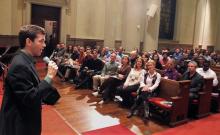Reformation Project

Over the past year, I have seen a tremendous amount of reformation and renewal taking place in the American Christian community around the topic of LGBTQ acceptance and equality. Like with many other justice issues in the past, entire new movements are calling God’s people forward, deeper into realizing the Kingdom of God on earth as it is in Heaven. And though there is still a lot of work left to do, the changes I have seen over the past year have been nothing short of inspiring.
Two years ago, the conversation around LGBTQ equality in evangelical circles was limited to a few “liberal” organizations, which were viewed by evangelicals as marginally Christian. But in 2014 we have seen literally dozens of evangelical leaders and organizations appear on the scene, taking momentous leaps forward as they advocate for their LGBTQ brothers and sisters around the world.
By God’s grace, I have been able to witness much of this transformation first hand. Last fall, I began writing about LGBTQ equality on my blog Revangelical. Soon after, a few posts turned into a clear calling from God to be a voice of reformation on this issue from within evangelical Christianity. I felt compelled to speak up with all of my fellow LGBTQ brothers and sisters who have faced so much discrimination and oppression at the hands of those who call themselves “people of Good News.”

It used to be that defining an “evangelical” was pretty straightforward: some version of a “born-again” experience, a deep appreciation for the Bible as the written Word of God and a conviction to spread salvation to the masses.
Opposing homosexuality wasn’t part of that holy trinity, but for most evangelicals, it was more or less a given that all sexuality outside of man-woman marriage is sinful. Not so much anymore.
Growing cultural acceptance of homosexuality is leading many Christians to reconsider their historic opposition. As intractable as the debate itself can be, American evangelicals nonetheless are experiencing lively conflicts over maintaining boundaries. What can you believe about gays and still call yourself an evangelical? And who gets to decide?
In October, the Vatican’s Synod on the Family and a major conference of establishment evangelicals in Nashville both featured softer rhetoric on gays and lesbians while reaffirming the view that homosexuality is morally disordered.
Last week in Washington, however, a gay evangelical activist laid out a biblical argument for an affirming view.
Matthew Vines was raised in a conservative Presbyterian congregation in Wichita, Kan. Realizing and accepting that he was gay, Vines neither abandoned religion nor sought out a more affirming church. Instead, he delved deeply into the Bible and Christian teaching. He came away with the conviction that biblical Christianity could affirm same-sex relationships.